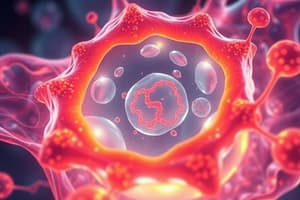Podcast
Questions and Answers
According to the cell theory, what are the main ideas regarding cells?
According to the cell theory, what are the main ideas regarding cells?
- Cells are not the building blocks of organisms
- Cells can only be found in animals
- Cells are the largest units of life
- All living organisms are composed of cells (correct)
True or False: Cells are the smallest units of life.
True or False: Cells are the smallest units of life.
True (A)
What process produces ATP in the mitochondria?
What process produces ATP in the mitochondria?
cellular respiration
_______ synthesizes proteins, while smooth ER synthesizes lipids.
_______ synthesizes proteins, while smooth ER synthesizes lipids.
Match the cell organelles with their functions:
Match the cell organelles with their functions:
Flashcards are hidden until you start studying
Study Notes
The Cell Theory
- All living organisms, from unicellular bacteria to multicellular organisms, are composed of cells, which are the basic structural and functional units of life.
- Cells are the smallest units of life, exhibiting characteristics such as metabolism, growth, reproduction, and response to stimuli.
Hierarchy of Cells to Organism
- The hierarchy of cells to organism is: cells -> tissues -> organs -> organ systems -> organism.
Cell Organelles and Their Functions
- Nucleus: contains genetic material (DNA) and controls cell activities.
- Mitochondria: produces ATP through cellular respiration, serving as the powerhouse of the cell.
- Endoplasmic Reticulum (ER): rough ER synthesizes proteins, while smooth ER synthesizes lipids.
- Golgi Apparatus: modifies, sorts, and packages proteins and lipids for secretion.
- Lysosomes: digests waste materials and cellular debris.
- Ribosomes: site of protein synthesis.
- Cytoplasm: a gel-like substance where organelles are suspended and many cellular processes occur.
Key Concept
- Cells arise from pre-existing cells, refuting the earlier idea of spontaneous generation.
Studying That Suits You
Use AI to generate personalized quizzes and flashcards to suit your learning preferences.




